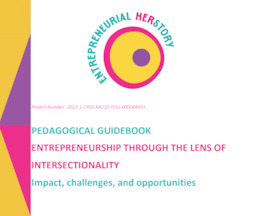Toolbox — For Training and Youth Work
All new tools in your inbox: Be the first to know about new tools for learning with our e-mail notifications.
Manual
"Entrepreneurial Herstory" project's Pedagogical Guidebook on "Entrepreneurship through the Lens of Intersectionality: Impact, Challenges and Opportunities"
The resource was developed by the "Entrepreneurial Herstory" Erasmus+ Youth project's consortium, and is the theoretical foundation for constructing women-led entrepreneurial role models, specifically focusing on those from underrepresented communities.
Aims of the tool
The “Entrepreneurial Herstory” project (Website: https://entrepreneurialherstory.eu/) is was co-funded by the Erasmus+ Programme, and was coordinated by C.I.P. CITIZENS IN POWER (Nicosia, Cyprus), in cooperation with CENTER FOR SOCIAL INNOVATION CSI (Nicosia, Cyprus), CHALLEDU (Athens, Greece), DRAMBLYS (Albacete, Spain), HELIXCONNECT EUROPE (Bucovat, Romania) and IDMConsulting (The Hague, Netherlands).
The “Entrepreneurial Herstory” project aimed to enhance the entrepreneurial mindset among young entrepreneurs. It focused on identifying role models away from toxic gendered stereotypes and values, by giving minorities and underrepresented communities a voice to express their stories and unfold their memoirs in terms of unconventional entrepreneurship.
The project’s objectives were be met by capacity building of the partner organisations, associated partners and stakeholders.
The project's Pedagogical Guidebook employed a mixed-methods approach to investigate the factors influencing entrepreneurship among disadvantaged social groups and women entrepreneurs in Cyprus, Greece, Romania, Spain and the Netherlands.
The objectives/aims of the project's Pedagogical Guidebook are the following:
1. To present the value of positive representation for underrepresented communities in entrepreneurship 2: to scrutinise on challenges that women entrepreneurs in underrepresented communities face in partners’ national
contexts
3. To present the theoretical framework of intersectionality
4. To investigate how the psychology of failure and success can play a significant role in entrepreneurship 5. To prove that failure is a part of every role model's success story
Description of the tool
A quantitative analysis of 63 diverse sources and qualitative research through semi-structured interviews with a total of 24 participants were conducted, with the following profiles: entrepreneurship experts, sociologists, and psychologists. The findings revealed the urban model of entrepreneurship is the most suitable for addressing and overcoming the challenges faced by these groups. The study emphasized the significance of robust characteristics, education, training opportunities, a supportive environment, and traits such as commitment, determination, patience, and a positive
mindset.
Positive representation was found to empower disadvantaged groups, fostering a sense of identity and belonging. Positive self-perception and self-presentation were identified as vital for the advancement of marginalized entrepreneurs. Public institutions were
highlighted as crucial stakeholders in supporting these initiatives, calling for a tailored, bottom-up approach. Furthermore, the study identified unique challenges faced by women entrepreneurs, especially those from disadvantaged backgrounds, including limited relevant
knowledge and skills and social/cultural factors.
The importance of intersectionality in networking, community support, solidarity, and the psychological dimension of these challenges was emphasized based on perspectives regarding failure and success, drawn from
interviews with psychologists. However, due to the complexity of intersectionality and its specific nuances depending on factors such as ethnicity and national context, generalizations were challenging to make. Also, entrepreneurial success is intertwined with the ability to
adapt, innovate, and confront failure constructively. A growth mindset, characterized by a proactive approach to learning from failure and embracing setbacks as opportunities for improvement, emerges as a vital mental framework. Women entrepreneurs, in particular,
face unique challenges stemming from societal gender norms and stereotypes. Embracing their natural strengths such as empathy, communication, and sociability, while cultivating self-love and resilience, can empower women to navigate male-dominated industries and surmount external barriers.
Overall, this study provides valuable insights into the
multifaceted dynamics of entrepreneurship among disadvantaged social groups and women, emphasizing the need for targeted interventions and support mechanisms.
Available downloads:
Disclaimer
SALTO cannot be held responsible for the inappropriate use of these training tools. Always adapt training tools to your aims, context, target group and to your own skills! These tools have been used in a variety of formats and situations. Please notify SALTO should you know about the origin of or copyright on this tool.
Tool overview

http://toolbox.salto-youth.net/4714
This tool is for
Primary Target groups: The Pedagogical Guidebook targets Youth Workers/trainers/educators and organisations that provide training in entrepreneurship. It also targets CSOs who are key players in creating the conditions for the realisation of human rights and for the transformation to a fair society for everyone with equal opportunities in education and labour.
and addresses
Social Inclusion, Disability, Personal Development, Organisational Management, Gender issues
It is recommended for use in:
Training and Networking
Duration:
2-5 hours of study (depending on how carefully the Guidebook is studied)
Behind the tool
The tool was created by
ENTREPRENEURIAL HERSTORY project Consortium
in the context of
"Entrepreneurial Herstory" Erasmus+ Youth project (Website: https://entrepreneurialherstory.eu/)
The tool has been experimented in
Pilot Testing and Training Sessions within the consortium and Externally with Youth Workers and young people in all partner countries (Cyprus, Greece, Spain, Romania, and Netherlands)
The tool was published to the Toolbox by
Andria Xenofontos (on 20 May 2025)
and last modified
7 February 2025
Comments
No comments have been posted yet.
If you want to comment on this tool, you need to be signed in with your MySALTO account. Sign in now